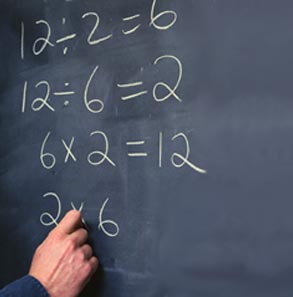Creating Young Urban Mathematicians
February 12, 2010 - How is math teaching and learning best done in city schools? Is math teaching in urban settings essentially different than in suburban or rural schools?
 Too many urban students leave school without the math skills they need to succeed in the 21st century, so a team of researchers at Penn, Rutgers and CUNY, working in four urban school districts (Philadelphia, New York, Newark, and Plainfield, New Jersey), decided to take action to address this pervasive, persistent problem. Together, they formed MetroMath: The Center for Mathematics in America’s Cities. With funding from the NSF, MetroMath took a three-pronged approach to addressing the challenges of urban math ed — strong teacher professional development, rigorous research, and a graduate program.
Too many urban students leave school without the math skills they need to succeed in the 21st century, so a team of researchers at Penn, Rutgers and CUNY, working in four urban school districts (Philadelphia, New York, Newark, and Plainfield, New Jersey), decided to take action to address this pervasive, persistent problem. Together, they formed MetroMath: The Center for Mathematics in America’s Cities. With funding from the NSF, MetroMath took a three-pronged approach to addressing the challenges of urban math ed — strong teacher professional development, rigorous research, and a graduate program.
One of the research studies based at Penn examined high school students' applied math practices. Working with a robotics club in one of Philadelphia's comprehensive high schools, GSE doctoral candidate John Baker and other MetroMath researchers interviewed students, collected artifacts, and acted as participant-observers as club members designed and built robots for regional competitions.
The premise of the work, Baker explained, is that "if you teach math in a way that's more meaningful to the students — if you build on their own mathematical practices outside the classroom, and show them how math can be useful out of school — you'll improve their engagement and their achievement."
School-based math instruction can typically give students a solid grounding in formal mathematics, but classroom instruction has generally been less effective at developing an intuitive sense of mathematics — one that lets students figure out real-world problems that aren’t presented as "math."
The poor integration of in-school and out-of-school math is well documented. MetroMath researchers looked closely at how youth use mathematical thinking and problem-solving in non-classroom-based settings to understand more about the connections they do and do not make. Said GSE professor and co-PI Janine Remillard, "We want to figure out how everyday math can inform how we teach math in the classroom." Accounting for students' cultural contexts and histories, both within and beyond the classroom, is particularly important to building these connections, and MetroMath faculty focused on using the assets of the local community to enhance understanding of mathematics by students and teachers.
The robotics club students viewed math as important — in the words of one club member, "How would you know to measure a wheel or something like that, if you didn’t know geometry? You need it." However, they generally preferred a trial-and-error approach over formal math practices — estimating the size for a component and cutting a trial model, instead of calculating precisely based on the robot's mechanical properties, for instance.
When formal mathematics or engineering practices were necessary, the students did use them, and over time, they developed hybrid practices — combining formal math with more hands-on attempts to accomplish the immediate task. The result was a use of math that was concrete, local, and oriented toward a particular task.
"We hope," said GSE’s Baker, "our work informs teachers and researchers to the informal and concrete ways youth use and value mathematics to problem solve outside of mathematics classrooms."
In addition to bringing researchers into schools, MetroMath helped teachers become researchers through its Teacher Fellows program.
Between 2004 and 2007, MetroMath Teacher Fellows participated in summer institutes and Saturday meetings during the academic year through which they designed research projects to undertake in their classrooms. [Each spring, Teacher fellows associated with all three universities met to present and discuss their research findings.]
Penn Alexander School teacher Maria Palaitis Ottinger, a veteran of the MetroMath program, spoke to the ways that MetroMath helps connect lessons learned in research to the classroom: "I take what I'm learning to work every day, and it's like having a living lab, where I can see the things we've been discussing play out," she explained.
In the fall of 2005, teacher fellows began to participate in the new graduate courses focused on mathematics teaching and learning in urban settings. Working alongside full-time doctoral students, teacher fellows explored research on urban education, teaching, and student learning.
This emphasis on instructional improvement through professional development and research at the classroom level was a distinguishing characteristic of MetroMath. The focus was on developing knowledge about students and teachers in their immediate cultural and educational contexts, and the approach resonates with Ottinger. Still at the Penn Alexander School, she's looking forward to using an updated version of its math curriculum and to continuing to improve her teaching.
"What I really like about the curriculum we use," she says, "is that it puts kids in the position of being mathematicians. They're solving problems and inventing strategies."
As did the MetroMath researchers.
